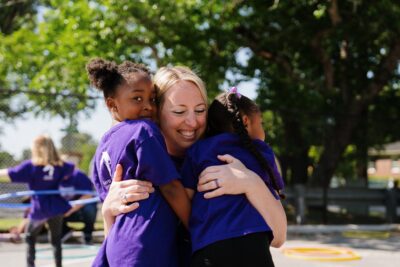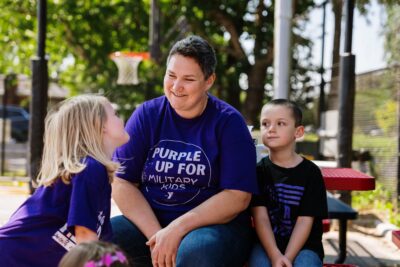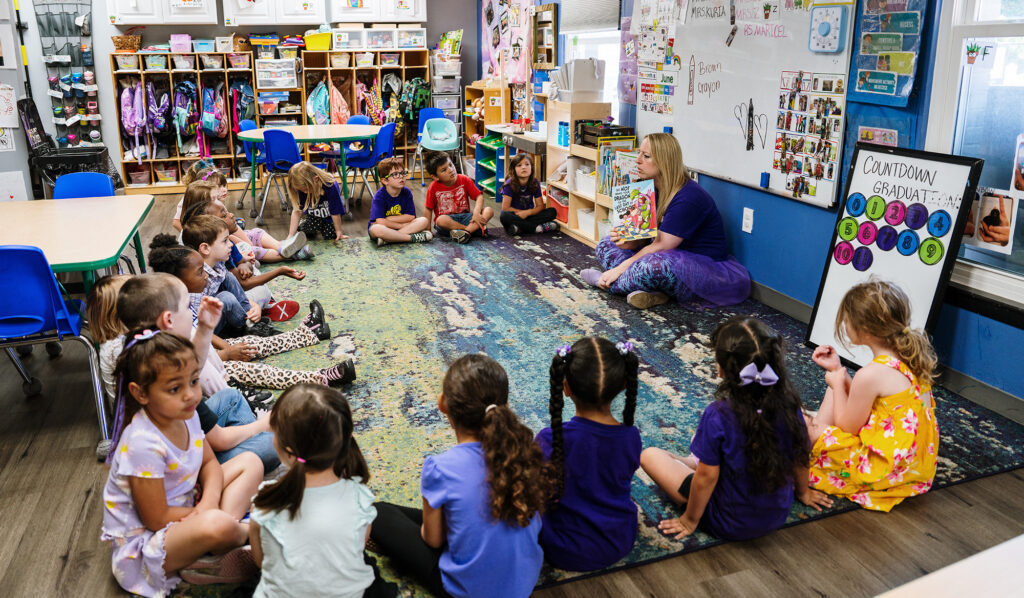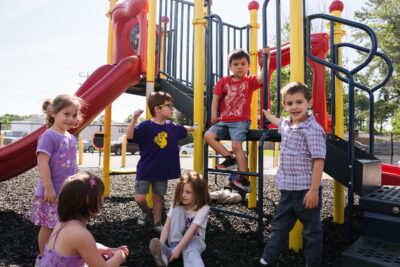Tips for Teachers Supporting Military Kids
Written by Julianna Burson
Teaching Students in Transition
It’s been a few years since I was a science teacher in a public school in Hampton Roads, but I vividly remember the classroom preparation, documentation, planning, and student lists that marked the start of the academic year. Reflecting on new students entering the classroom, I am reminded of the nervousness, anxiety, eagerness, and excitement each one brought — every classroom a mix of social butterflies, wallflowers, bookworms, and entertainers, all with different academic, social, cultural, and financial backgrounds.
It’s hard being the new kid — and even harder when the move is a significant distance and comes with the loss of an entire social support network. I now have a deeper understanding of that as a military parent — a perspective that would have benefited my former students. Supporting military families as a civilian is one thing; living the lifestyle and making the sacrifices as a military family is very different.
Teaching is like a box of chocolates: you never know what you’re going to get. Teachers work to meet every child’s needs, a daunting task when we often only see the tip of the iceberg. The best teachers I know dedicate themselves to students both inside and outside the classroom. The more we know aboutour students, the better we can help them.
It takes time to build relationships with students and their families, but a little extra awareness can go a long way. From one teacher to another, here are my best tips for supporting military children throughout the academic year.
Understand the Story Behind the Student
Military children face numerous uncertainties in this chaotic, mobile lifestyle, changing schools up to nine times before graduation. They are three times more likely to move than civilian children. A Permanent Change of Station (PCS) can bring challenges like significant differences in curricula, standards, courses, and even cultures.
There can be academic gaps as each state sets its requirements. Course credits may not transfer, and some coursework may need to be repeated, potentially delaying graduation. School start and end dates vary widely, leading to additional academic interruptions.
Every PCS is stressful for military families — financially, physically, and emotionally. Some may also face military food insecurity as a result. Each relocation can mean losing friends, extended family, teachers, and extracurricular mentors — all of which can affect academic performance.
The Armed Services YMCA (ASYMCA) provides military support through programs like Operation Hero, an after-school resiliency program for military children struggling at home or in school, often working closely with local educators to reach the students most in need.
Build Flexible, Trauma-Informed Classrooms
Many military kids struggle with control and continuity because so much of their life is dictated by the military, and the only thing constant is change. The structure and routine of a classroom — paired with grace — can help keep students grounded and secure.
- Be Flexible – Offer extensions for assignments, provide supplemental resources to fill academic gaps, create a space in the classroom for students with music, art, and sensory resources when they may need a break from classmates, or send them to a counselor when needed. Be a shoulder to cry on.
- Keep a List of Local Resources – Local food pantries/distributions and clothing closet recommendations can be very helpful to military families new to the area.
- Ask for Feedback – Ask your military children and parents how they can best be supported, and be aware of upcoming military separations, deployments, and PCS moves. Listen to your students if they tell you they have not learned the content yet.
- Utilize ASYMCA Resources – More than 25% of active-duty families need food assistance. The ASYMCA offers food assistance at sites across the country, as well as parenting resources to strengthen stability at home, complementing classroom instruction.
- Become Familiar with the Military Interstate Children’s Compact Commission (MIC3) – The MIC3 was created to address the educational needs of military children transitioning from PCS moves, leveling the playing field with students who aren’t uprooted every two years. Military families may not be aware of the legal protection afforded to their children as a result of active-duty military service. MIC3 protects against differences in varied state curricula, enrollment issues, graduation requirements, and more.
- Connect with a School Liaison (SL) – SLs assist military families and teachers with issues related to education, transfers, and deployments impacting military children. To learn more, watch this video about School Liaisons.
- Utilize the Military Child Education Coalition (MCEC) – The MCEC provides training, programs, resources, and guidance to military families and educational professionals.
Encourage Connection and Inclusion

At the start of the school year, I used “All About Me” worksheets so students could share their favorite colors, subjects, hobbies, career aspirations, and languages spoken. We’d then do an activity where students found classmates with similar interests.
This helped me form academic groupings — for example, pairing a math-lover with someone who needed extra support, or connecting English learners with classmates fluent in their language. I also asked about family military status so I could introduce new students to other military-connected peers.
For students arriving mid-year, I still had them complete the form. Federal cards — forms sent home to all public-school students — help schools identify military-connected children. These cards are part of a federal program providing additional funding for schools based on the number of military or federally connected students. Since federal property isexempt from local property taxes, this funding helps offset the gap in public school budgets. However, they don’t account for new military children arriving after the cards are collected.
Another tip for teachers: A “classroom buddy” or “trusted friend” can be a great way to help new students acclimate. Encourage military children to share their unique experiences if they wish — the good, the bad, and everything in between. Outside the classroom, ASYMCA programs like Operation Hero, Operation Camp, and local events help foster social connection and stability.
Communicate with Empathy and Awareness
Military parents may seem distracted or uninvolved, but many are overwhelmed by the demands of military life — PCS moves, military deployments, and caregiving responsibilities.
Pro tip for teachers: Learn each parent’s preferred communication method and try to include at least one positive remark if you need to share a concern. Make a point also to share successes — often, the only school communication parents receive is when something is wrong.
Recognize Deployment-Specific Needs
Military deployments can significa ntly impact a child’s academic and emotional well-being. The average deployment lasts six to twelve months, with reintegration often being the most challenging phase for families.
ntly impact a child’s academic and emotional well-being. The average deployment lasts six to twelve months, with reintegration often being the most challenging phase for families.
School events that focus heavily on “family” can be painful for students separated from a parent. Compassion, empathy, and small gestures, such as journaling or taking on leadership roles in class, can boost confidence and self-esteem. These are important tips for teachers to keep in mind when working with military-connected students during deployment cycles.
Effects of Military Deployments on Children
Significant behavioral changes can be observed in some military children during deployment, while others appear more resilient or are great at masking. Here are six behavioral changes to look for when a military child’s parent is deployed:
- Increased absences/tardiness
- Dwindling grades
- Late assignments
- Increased anxiety/depression
- Challenges in peer relationships
- Difficulties with parental relationships
Partnering with the ASYMCA on military support initiatives or classroom resources is a great way to address these challenges head-on. The ASYMCA offers affordable Child Care & Preschool options, a Children’s Waiting Room, and engaging after-school programs at many locations, reinforcing classroom instruction in a structured setting.
Every Act of Understanding Matters
Teachers play an essential role in the lives of students; everyone can recall a teacher who significantly impacted their life. The awareness and compassion of educators can be crucial to the success of a student’s school year – and sometimes, their life.
I am grateful to all educators: public, private, homeschool, extracurricular, and enrichment. Knowledge is powerful; it encourages growth, independence, confidence, and creativity. Teaching is not for the faint of heart and should be celebrated more — working with our youth and shaping future generations is hard work and invaluable.
As a parent, it is my job to communicate effectively with my child’s teachers. As an educator, it is essential to be knowledgeable, understanding, flexible, and compassionate to all students. Being a military spouse and parent of a military child has given me a new perspective — and heightened empathy — for the unique challenges military children face.
Explore the ASYMCA’s services for students and families. The military lifestyle doesn’t come with instructions, and you may be the one to introduce them to the resources that could change their life.


